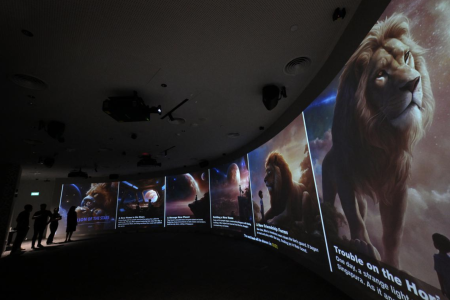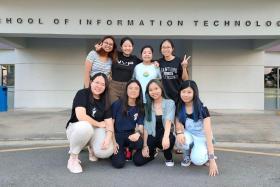S’pore writers slam NLB’s ‘uncritical endorsement’ of generative AI
Members of Singapore’s literary community are calling on the National Library Board (NLB) to exercise greater prudence in adopting generative artificial intelligence (AI) or risk “permanently damaging Singapore’s literary landscape”.
A collective statement signed by 68 writers released on Jan 7 questioned the NLB’s “uncritical endorsement” of the technology. The library has introduced a series of programmes using AI since January 2024, including StoryGen, a generative AI prototype for immersive experiences jointly produced with Amazon Web Services.
The signatories – who include writers, publishers, educators and other cultural workers – called on the library to remove any suggestion that generative AI is “an adequate substitute for traditional writing development”. It also called on NLB to educate the public on the technology’s limitations, as well as its negative impact on learning and the environment.
Among the signatories are Cultural Medallion recipient Haresh Sharma, Singapore Literature Prize winners Prasanthi Ram and Marylyn Tan, International Booker Prize-longlisted translator Jeremy Tiang, as well as Peter Schoppert, former president of the Singapore Book Publishers Association.
This is the first collective statement by Singapore’s literary community on the impact of generative AI on the writing landscape. In April 2024, individual writers and publishers objected to the Infocomm Media Development Authority’s plans to build a South-east Asia-focused large language model, but stopped short of a collective stance.
This latest statement also cited generative AI’s threat to a writer’s intellectual property as one of the literary community’s major concerns, adding: “NLB’s promotion of AI has not been accompanied by warnings about the ethical problems of the field, and thereby normalises intellectual theft.”

Citing an NLB event titled Children Write: Publish A Book With Gen-AI, designed for participants aged seven to 12, the statement raised concerns that such an event “furthers a belief that use of this technology can be a substitute for traditional writing skills”.
It added that AI will adversely affect the quality of literature produced and that the technology’s environmental costs – composing a single e-mail with ChatGPT has been found to consume over half a litre of water – contradicts the library’s sustainability initiatives.
The statement, addressed to NLB’s chairman Lee Seow Hiang, chief executive Ng Cher Pong and chief librarian and chief information officer Gene Tan, as well as Minister for Digital Development and Information Josephine Teo, called for a consultation with members of the literary community to address these issues.
It acknowledged the relevance of AI tools and their potential applications in the literary arts, but added: “As a national institution, NLB is uniquely positioned to educate the public on how it is possible to use AI responsibly.”
Author Ng Yi-Sheng, one of the organisers of the statement, wrote on Substack: “Chief librarian Gene Tan has already read the letter and initiated dialogue. He has informed me of an official NLB website which is used to educate StoryGen users about the ethical issues of AI. I personally find this insufficient.”
NLB launched StoryGen and Chatbook in 2024, two tech prototypes developed with Amazon Web Services using generative AI. Chatbook is a chat service in which users can “converse” with books by asking questions, most recently featuring The Singapore Lion, Irene Ng’s biography of Singapore’s first culture and foreign minister S. Rajaratnam.
Concerns have escalated in recent years as models such as ChatGPT have been trained on materials without authorisation from copyright holders. ChatGPT’s owner, tech firm OpenAI, has been sued by The Authors Guild – alongside popular fantasy author George R.R. Martin and several major Canadian news organisations – for the misuse of copyrighted material.
In 2023, the names of Singaporean writers such as novelists Balli Kaur Jaswal, Ovidia Yu and Rachel Heng, as well as founding prime minister Lee Kuan Yew, were found in the Books3 database, which lists thousands of authors whose copyrighted work have been stolen to train large language models similar to ChatGPT.
In response to The Straits Times’ queries, an NLB spokesman said the library values the trust of the literary community and that its AI prototypes are meant to complement, not replace, authors’ efforts.
The spokesman added: “We take concerns about Generative AI seriously and have implemented safeguards to ensure ethical and responsible use. All materials used are within NLB’s copyright, appropriately licensed, or no longer under copyright.”
NLB said it would work more closely with the literary community to address ongoing concerns and create new opportunities for writers and publishers.
Get The New Paper on your phone with the free TNP app. Download from the Apple App Store or Google Play Store now


